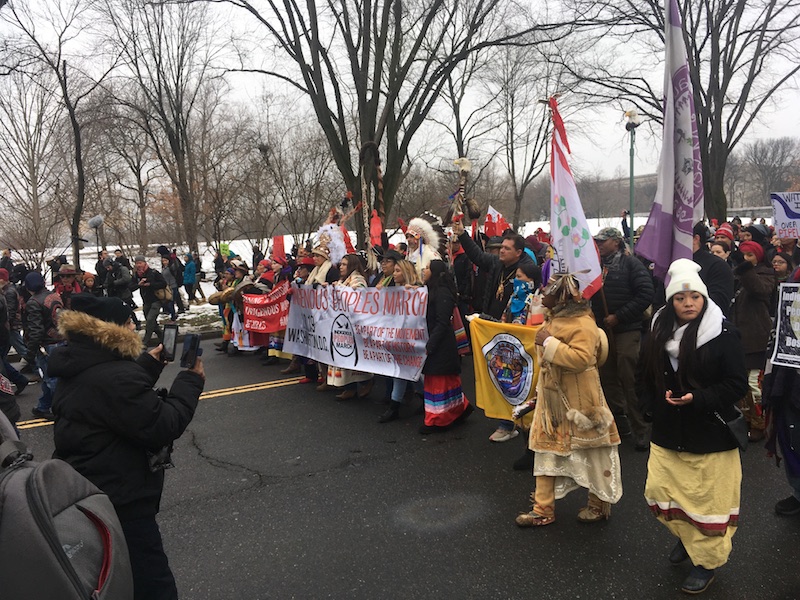Indigenous Peoples Show Solidarity at D.C. March
Activists address a range of concerns, including oil pipelines and police brutality. Indigenous peoples and their allies march down 17th Street on the National Mall on Friday. (Naomi LaChance / Truthdig)
Indigenous peoples and their allies march down 17th Street on the National Mall on Friday. (Naomi LaChance / Truthdig)
Activists from around the world gathered for the first-ever Indigenous Peoples March in Washington, D.C., on Friday. Issues including voter suppression, environmental protections and violence toward women and girls were at the forefront of the event.
“Our people are under constant threat, from pipelines, from police, from a system that wants to forget the valuable perspectives we bring to the table. But those challenges make us stronger,” said Chase Iron Eyes, an attorney at the Lakota People’s Law Project and member of the Standing Rock Sioux tribe.
The indigenous people’s march pic.twitter.com/wnhZKP1AR4
— Naomi LaChance (@lachancenaomi) January 18, 2019
Iron Eyes, who was a leader in the movement against the Dakota Access pipeline in 2016 and 2017, said he supports the “Green New Deal”—Rep. Alexandria Ocasio-Cortez’s proposal to address climate change through an economic stimulus program.
In the U.S., indigenous Americans are subject to disproportionate levels of police brutality, another focus of the march. “We must remind the world, again, that indigenous people matter. We are all made better when we respect one another and lift each other up,” Iron Eyes said.
This month, Canadian police arrested 14 people at a checkpoint where members of the Wet’suwet’en First Nation were trying to block construction of TransCanada’s Coastal GasLink pipeline. In Minnesota, indigenous people are fighting the construction of Enbridge’s Line 3 pipeline.
“We don’t want these tar sands going through our waters,” said Tara Houska, National Campaigns Director of the group Honor the Earth and adviser to Bernie Sanders’ 2016 presidential campaign.
More from the march this morning pic.twitter.com/K5SVjEoBQo
— Naomi LaChance (@lachancenaomi) January 18, 2019
New Mexico Rep. Deb Haaland spoke at the rally.
“We need to build a future we can be proud of.” – Deb Haaland speaking at the Indigenous Peoples March in DC. #befierce #ipmdc19 pic.twitter.com/3HgJv9EhWa
— A.A.I.A. (@IndianAffairs) January 18, 2019
“As one of the first Native American women in Congress, I see it as my responsibility to educate my colleagues about the federal government’s trust responsibility and provide a voice to advocate for those who have historically not had a seat at the table to make a long-awaited change,” she said in a statement before the rally.
Another key focus of the event was violence against women. More than 5,000 native women are estimated to be missing in the U.S. More than half of indigenous women in the U.S. have experienced sexual violence; the attacker is almost always a non-tribal member.
A prayer for missing and murdered indigenous women pic.twitter.com/wa0mYy68En
— Naomi LaChance (@lachancenaomi) January 18, 2019
“I’m just this old Ojibwe woman from the north… I come as an elder, I come as a people, I come to you.” #IPMDC19 pic.twitter.com/UJFMHorPam
— Jourdan Bennett-Begaye (@jourdanbb) January 18, 2019
“Without the unity of the indigenous people we have no future for indigenous people,” said artist and activist Queen Melé Le’iato Tuiasosopo Muhammad Ali.
Your support matters…Independent journalism is under threat and overshadowed by heavily funded mainstream media.
You can help level the playing field. Become a member.
Your tax-deductible contribution keeps us digging beneath the headlines to give you thought-provoking, investigative reporting and analysis that unearths what's really happening- without compromise.
Give today to support our courageous, independent journalists.






You need to be a supporter to comment.
There are currently no responses to this article.
Be the first to respond.